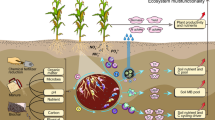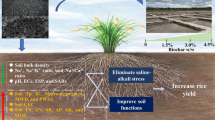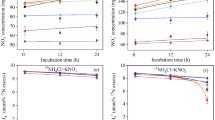Abstract
Purpose
Nitrogen (N) is an important element for crop yield and its availability may be affected by biochar. The mechanisms through which biochar influences N availability and thus crop productivity remain largely unclear, although they seem to be principally mediated by microbial processes. The objective of this study was to assess the effects of rice straw biochar on soil N availability and microbial functional genes (MFG) involved in N transformations under field experiment.
Materials and methods
The field experiment was performed using biochar amendment (0, 20, 40 t ha−1) with or without N fertilizer application in a rice paddy in central China.
Results
The results suggested that the soil NH4+-N content showed a decreasing trend during the early stage of rice growing season while increasing its availability during the later stage in the plots with biochar amendment as compared with control. Nonetheless, soil NO3−-N was not affected by biochar addition, N fertilization, and their interaction at most of the sampling times. With the increase of N fertilizer and biochar application, soil MBC and MBN increased in most of the sampling times during the first and second seasons. The N uptake was significantly positively correlated with soil MBC and MBN in the first and second seasons. Biochar addition also affected some MFG involved in N transformations, causing a general decrease in the abundance of bacterial ammonia oxidizers during mature stage and narG (nitrate reduction) at heading stage during the second season independent of biochar application rates, while increase in nifH (nitrogen fixation) at heading stage during the first season in 40 t ha−1 biochar treatments with N application, as compared with the control. However, there is lack of significant relationships between measured soil inorganic N and genetic data for each season.
Conclusion
As a result, the application of biochar had a slow release effect on soil NH4+-N and regulated the N uptake in rice. However, we believe that the dynamic of soil N availability during rice growing seasons may have been dominantly driven by abiotic factors rather than microbially mediated processes in double rice-cropping system.





Similar content being viewed by others
Availability of data and materials
All data and materials generated or analyzed during this study are included in this published article (and its supplementary information files).
References
Aamer M, Shaaban M, Hassan MU, Huang G, Liu Y, Tang HY, Rasul F, Ma Q, Li Z, Rasheed A, Zhang P (2020) Biochar mitigates the N2O emissions from acidic soil by increasing the nosZ and nirK gene abundance and soil pH. J Environ Manage. https://doi.org/10.1016/j.jenvman.2019.109891
Anderson CR, Hamonts K, Clough TJ, Condron LM (2014) Biochar does not affect soil N-transformations or microbial community structure under ruminant urine patches but does alter relative proportions of nitrogen cycling bacteria. Agr Ecosyst Environ 191:63–72. https://doi.org/10.1016/j.agee.2014.02.021
Bai SH, Reverchon F, Xu C, Xu Z, Blumfield TJ, Zhao H, Van Zwieten L, Wallace HM (2015) Wood biochar increases nitrogen retention in field settings mainly through abiotic processes. Soil Biol Biochem 90:232–240. https://doi.org/10.1016/j.soilbio.2015.08.007
Borchard N, Schirrmann M, Cayuela ML, Kammann C, Wrage-Mönnig N, Estavillo JM, Fuertes-Mendizábal T, Sigua G, Spokas K, Ippolito JA, Novak J (2019) Biochar, soil and land-use interactions that reduce nitrate leaching and N2O emissions: a meta-analysis. Sci Total Environ 651:2354–2364. https://doi.org/10.1016/j.scitotenv.2018.10.060
Bouwman L, Goldewijk KK, Van Der Hoek KW, Beusen AHW, Van Vuuren DP, Willems J, Rufinoe MC, Stehfest E (2013) Exploring global changes in nitrogen and phosphorus cycles in agriculture induced by livestock production over the 1900–2050 period. P Natl Acad Sci USA 110:20882–20887. https://doi.org/10.1073/pnas.1012878108
Case SDC, McNamara NP, Reay DS, Stott AW, Grant HK, Whitaker J (2015) Biochar suppresses N2O emissions while maintaining N availability in a sandy loam soil. Soil Biol Biochem 81:178–185. https://doi.org/10.1016/j.soilbio.2014.11.012
Cayuela ML, Van Zwieten L, Singh BP, Jeffery S, Roig A, Sánchez-Monedero MA (2014) Biochar’s role in mitigating soil nitrous oxide emissions: a review and meta-analysis. Agr Ecosyst Environ 191:5–16. https://doi.org/10.1016/j.agee.2013.10.009
Clough TJ, Condron LM (2010) Biochar and the nitrogen cycle: introduction. J Environ Qual 39:1218–1223. https://doi.org/10.2134/jeq2010.0204
Clough TJ, Condron LM, Kammann C, Müller C (2013) A review of biochar and soil nitrogen dynamics. Agronomy-Basel 3:275–293. https://doi.org/10.3390/agronomy3020275
Crombie K, Mašek O, Cross A, Sohi S (2015) Biochar-synergies and trade-offs between soil enhancing properties and C sequestration potential. Gcb Bioenergy 7:1161–1175. https://doi.org/10.1111/gcbb.12213
Cui Y, Meng J, Wang Q, Zhang W, Cheng X, Chen W (2017) Effects of straw and biochar addition on soil nitrogen, carbon, and super rice yield in cold waterlogged paddy soils of North China. J Integr Agri 16:1064–1074. https://doi.org/10.1016/S2095-3119(16)61578-2
Deenik JL, McClellan T, Uehara G, Antal MJ, Campbell S (2010) Charcoal volatile matter content influences plant growth and soil nitrogen transformations. Soil Sci Soc Am J 74:1259–1270. https://doi.org/10.2136/sssaj2009.0115
Ding Y, Liu Y-X, Wu W-X, Shi D-Z, Yang M, Zhong Z-K (2010) Evaluation of biochar effects on nitrogen retention and leaching in multi-layered soil columns. Water Air Soil Poll 213:47–55. https://doi.org/10.1007/s11270-010-0366-4
Guo J, Ling N, Chen H, Zhu C, Kong Y, Wang M, Shen Q, Guo S (2017) Distinct drivers of activity, abundance, diversity and composition of ammonia-oxidizers: evidence from a long-term field experiment. Soil Biol Biochem 115:403–414. https://doi.org/10.1016/j.soilbio.2017.09.007
Guo JH, Liu XJ, Zhang Y, Shen JL, Han WX, Zhang WF, Christie P, Goulding KWT, Vitousek PM, Zhang FS (2010) Significant acidification in major Chinese croplands. Science 327:1008–1010. https://doi.org/10.1126/science.1182570
Haider G, Steffens D, Moser G, Müller C, Kammann CI (2017) Biochar reduced nitrate leaching and improved soil moisture content without yield improvements in a four-year field study. Agric Ecosyst Environ 237:80–94. https://doi.org/10.1016/j.agee.2016.12.019
Huang M, Fan L, Chen J, Jiang L, Zou Y (2018) Continuous applications of biochar to rice: effects on nitrogen uptake and utilization. Sci Rep-Uk. https://doi.org/10.1038/s41598-018-29877-7
Huang M, Yang L, Qin H, Jiang L, Zou Y (2014) Fertilizer nitrogen uptake by rice increased by biochar application. Biol Fertil Soils 50:997–1000. https://doi.org/10.1007/s00374-014-0908-9
IUSS Working Group WRB (2006) World reference base for soil resources. World Soil Resources Reports 103
Jang HM, Choi YK, Kan E (2018) Effects of dairy manure-derived biochar on psychrophilic, mesophilic and thermophilic anaerobic digestions of dairy manure. Bioresource Technol 250:927–931. https://doi.org/10.1016/j.biortech.2017.11.074
Jaynes DB, Colvin TS, Karlen DL, Cambardella CA, Meek DW (2001) Nitrate loss in subsurface drainage as affected by nitrogen fertilizer rate. J of Environ Qual 30:1305–1314. https://doi.org/10.2134/jeq2001.3041305x
Kanthle AK, Lenka NK, Lenka S, Tedia K (2016) Biochar impact on nitrate leaching as influenced by native soil organic carbon in an Inceptisol of central India. Soil Tillage Res 157:65–72. https://doi.org/10.1016/j.still.2015.11.009
Kanthle AK, Lenka NK, Tedia K (2018) Land use and biochar effect on nitrate leaching in a Typic Haplustert of central India. Catena 167:422–428. https://doi.org/10.1016/j.catena.2018.05.014
Kchikich A, Mrid RB, Kabach I, Nhiri M, Omari RE (2021) Arbuscular mycorrhizal fungi enhance sorghum plant growth under nitrogen-deficient conditions through activation of nitrogen and carbon metabolism enzymes. Int J Agric Biol 26:201‒208. https://doi.org/10.17957/IJAB/15.1825
Lal R (2004) Soil carbon sequestration impacts on global climate change and food security. Science 304:1623–1627. https://doi.org/10.1126/science.1097396
Le C, Zha Y, Li Y, Sun D, Lu H, Yin B (2010) Eutrophication of lake waters in China: cost, causes, and control. Environ Manage 45:662–668. https://doi.org/10.1007/s00267-010-9440-3
Liao J, Hu A, Zhao Z, Liu X, Jiang C, Zhang Z (2021) Biochar with large specific surface area recruits N2O-reducing microbes and mitigate N2O emission. Soil Biol Biochem 156:108212. https://doi.org/10.1016/j.soilbio.2021.108212
Liu D, Ding Z, Ali EF, Kheir AMS, Eissa MA, Ibrahim OHM (2021) Biochar and compost enhance soil quality and growth of roselle (Hibiscus sabdariffa L.) under saline conditions. Sci Rep-UK. https://doi.org/10.1038/s41598-021-88293-6
Liu Y, Li H, Hu T, Mahmoud A, Li J, Zhu R, Jiao X, Jing P (2022) A quantitative review of the effects of biochar application on rice yield and nitrogen use efficiency in paddy fields: a meta-analysis. Sci Total Environ. https://doi.org/10.1016/j.scitotenv.2022.154792
Lu RK (2000) Methods of soil and agro-chemical analysis. China Agricultural Science and Technology Press, Beijing 127–332
Lv R, Wang Y, Yang X, Wen Y, Tan X, Zeng Y, Shang Q (2021) Adsorption and leaching characteristics of ammonium and nitrate from paddy soil as affected by biochar amendment. Plant Soil Environ 67:8–17. https://doi.org/10.17221/276/2020-PSE
Mukherjee A, Zimmerman AR (2013) Organic carbon and nutrient release from a range of laboratory-produced biochars and biochar-soil mixtures. Geoderma 193–194:122–130. https://doi.org/10.1016/j.geoderma.2012.10.002
Nelissen V, Rütting T, Huygens D, Staelens J, Ruysschaert G, Boeckx P (2012) Maize biochars accelerate short-term soil nitrogen dynamics in a loamy sand soil. Soil Biol Biochem 55:20–27. https://doi.org/10.1016/j.soilbio.2012.05.019
Nielsen S, Joseph S, Ye J, Chia C, Munroe P, Van Zwieten L, Thomas T (2018) Crop-season and residual effects of sequentially applied mineral enhanced biochar and N fertiliser on crop yield, soil chemistry and microbial communities. Agr Ecosyst Environ 255:52–61. https://doi.org/10.1016/j.agee.2017.12.020
Nikolenko O, Jurado A, Borges AV, Knӧller K, Brouyѐre S (2018) Isotopic composition of nitrogen species in groundwater under agricultural areas: a review. Sci Total Environ 621:1415–1432. https://doi.org/10.1016/j.scitotenv.2017.10.086
Novak JM, Busscher WJ, Watts DW, Laird DA, Ahmedna MA, Niandou MAS (2010) Short-term CO2 mineralization after additions of biochar and switchgrass to a Typic Kandiudult. Geoderma 154:281–288. https://doi.org/10.1016/j.geoderma.2009.10.014
Prommer J, Wanek W, Hofhansl F, Trojan D, Offre P, Urich T, Schleper C, Sassmann S, Kitzler B, Soja G, Hood-Nowotny RC (2014) Biochar decelerates soil organic nitrogen cycling but stimulates soil nitrification in a temperate arable field trial. PLoS ONE. https://doi.org/10.1371/journal.pone.0086388
Rondon MA, Lehmann J, Ramírez J, Hurtado M (2007) Biological nitrogen fixation by common beans (Phaseolus vulgaris L.) increases with bio-char additions. Bio and Fert Soils 43:699–708. https://doi.org/10.1007/s00374-006-0152-z
Singh BP, Hatton BJ, Singh B, Cowie AL, Kathuria A (2010) Influence of biochars on nitrous oxide emission and nitrogen leaching from two contrasting soils. J Environ Qual 39:1224–1235. https://doi.org/10.2134/jeq2009.0138
Slavich PG, Sinclair K, Morris SG, Kimber SWL, Downie A, Van Zwieten L (2013) Contrasting effects of manure and green waste biochars on the properties of an acidic ferralsol and productivity of a subtropical pasture. Plant Soil 366:213–227. https://doi.org/10.1007/s11104-012-1412-3
Song Y, Zhang X, Ma B, Chang SX, Gong J (2014) Biochar addition affected the dynamics of ammonia oxidizers and nitrification in microcosms of a coastal alkaline soil. Biol Fert of Soils 50:321–332. https://doi.org/10.1007/s00374-013-0857-8
Taghizadeh-Toosi A, Clough TJ, Sherlock RR, Condron LM (2012a) Biochar adsorbed ammonia is bioavailable. Plant Soil 350:57–69. https://doi.org/10.1007/s11104-011-0870-3
Taghizadeh-Toosi A, Clough TJ, Sherlock RR, Condron LM (2012b) A wood based low-temperature biochar captures NH3-N generated from ruminant urine-N, retaining its bioavailability. Plant Soil 353:73–84. https://doi.org/10.1007/s11104-011-1010-9
Taketani RG, Tsai SM (2010) The influence of different land uses on the structure of archaeal communities in Amazonian anthrosols based on 16S rRNA and amoA genes. Microb Ecol 59:734–743. https://doi.org/10.1007/s00248-010-9638-1
Tian J, Miller V, Chiu PC, Maresca JA, Guo M, Imhoff PT (2016) Nutrient release and ammonium sorption by poultry litter and wood biochars in stormwater treatment. Sci Total Environ 553:596–606. https://doi.org/10.1016/j.scitotenv.2016.02.129
Ulyett J, Sakrabani R, Kibblewhite M, Hann M (2014) Impact of biochar addition on water retention, nitrification and carbon dioxide evolution from two sandy loam soils. Eur J Soil Sci 65:96–104. https://doi.org/10.1111/ejss.12081
Van Zwieten L, Kimber S, Downie A, Morris S, Petty S, Rust J, Chan KY (2010a) A glasshouse study on the interaction of low mineral ash biochar with nitrogen in a sandy soil. Soil Res 48:569–576. https://doi.org/10.1071/SR10003
Van Zwieten L, Kimber S, Morris S, Downie A, Berger E, Rust J, Scheer C (2010b) Influence of biochars on flux of N2O and CO2 from Ferrosol. Soil Res 48:555–568. https://doi.org/10.1071/SR10004
Van Zwieten L, Rose T, Herridge D, Kimber S, Rust J, Cowie A, Morris S (2015) Enhanced biological N2 fixation and yield of faba bean (Vicia faba L) in an acid soil following biochar addition: dissection of causal mechanisms. Plant Soil 395:7–20. https://doi.org/10.1007/s11104-015-2427-3
Van Zwieten L, Singh BP, Kimber SWL, Murphy DV, Macdonald LM, Rust J, Morris S (2014) An incubation study investigating the mechanisms that impact N2O flux from soil following biochar application. Agr Ecosyst Environ 191:53–62. https://doi.org/10.1016/j.agee.2014.02.030
Wang J, Zhang M, Xiong Z, Liu P, Pan G (2011) Effects of biochar addition on N2O and CO2 emissions from two paddy soils. Biol Fert Soils 47:887–896. https://doi.org/10.1007/s00374-011-0595-8
Wang S, Xia G, Zheng J, Wang Y, Chen T, Chi D, Bolan NS, Chang SX, Wang T, Ok YS (2022) Mulched drip irrigation and biochar application reduce gaseous nitrogen emissions, but increase nitrogen uptake and peanut yield. Sci Total Environ. https://doi.org/10.1016/j.scitotenv.2022.154753
Xiao Z, Rasmann S, Yue L, Lian F, Zou H, Wang Z (2019) The effect of biochar amendment on N-cycling genes in soils: a meta-analysis. Sci Total Environ 696:133984. https://doi.org/10.1016/j.scitotenv.2019.133984
Xu N, Tan G, Wang H, Gai X (2016) Effect of biochar additions to soil on nitrogen leaching, microbial biomass and bacterial community structure. Eur J Soil Biol 74:1–8. https://doi.org/10.1016/j.ejsobi.2016.02.004
Zhai L, CaiJi Z, Liu J, Wang H, Ren T, Gai X, Xi B, Liu H (2015) Short-term effects of maize residue biochar on phosphorus availability in two soils with different phosphorus sorption capacities. Biol Fert Soils 51:113–122. https://doi.org/10.1007/s00374-014-0954-3
Zhang W, Yu YQ, Huang Y, Li TT, Wang P (2011) Modeling methane emissions from irrigated rice cultivation in China from 1960 to 2050. Glob Change Biol Bioenergy 17:3511–3523. https://doi.org/10.1111/j.1365-2486.2011.02495.x
Zheng H, Wang Z, Deng X, Herbert S, Xing B (2013) Impacts of adding biochar on nitrogen retention and bioavailability in agricultural soil. Geoderma 206:32–39. https://doi.org/10.1016/j.geoderma.2013.04.018
Funding
This work was funded by the National Natural Science Foundation of China (Grant No. 31601833 and 42167004).
Author information
Authors and Affiliations
Contributions
Shang QY conceived, designed, and financially supported the study; Lv RJ analyzed the data and wrote the paper; Wang Y and Wang QY supervised the field trial; Wen YP reviewed and edited the manuscript. All authors read and approved the final manuscript.
Corresponding author
Ethics declarations
Competing interests
The authors declare no competing interests.
Additional information
Responsible editor: Shahla Hosseini Bai
Publisher's Note
Springer Nature remains neutral with regard to jurisdictional claims in published maps and institutional affiliations.
Supplementary Information
Below is the link to the electronic supplementary material.
Rights and permissions
Springer Nature or its licensor (e.g. a society or other partner) holds exclusive rights to this article under a publishing agreement with the author(s) or other rightsholder(s); author self-archiving of the accepted manuscript version of this article is solely governed by the terms of such publishing agreement and applicable law.
About this article
Cite this article
Lv, R., Wang, Y., Wang, Q. et al. Rice straw biochar alters inorganic nitrogen availability in paddy soil mainly through abiotic processes. J Soils Sediments 23, 568–581 (2023). https://doi.org/10.1007/s11368-022-03355-0
Received:
Accepted:
Published:
Issue Date:
DOI: https://doi.org/10.1007/s11368-022-03355-0




